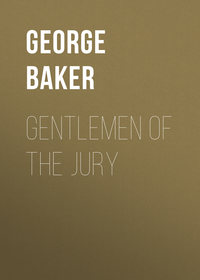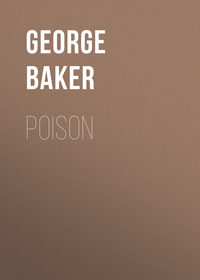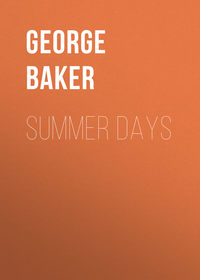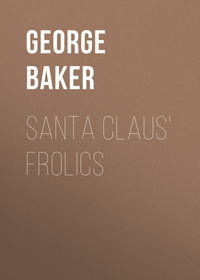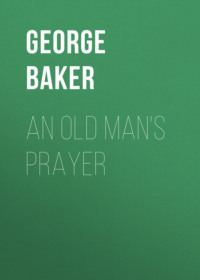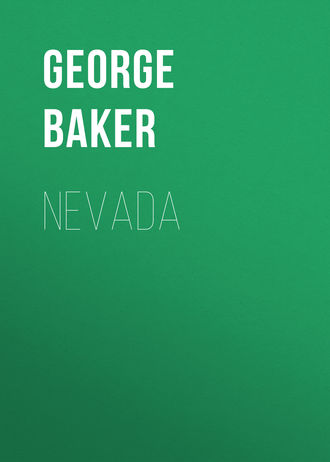
Nevada
Vermont. Poor old chap.
Silas. With a gold-mine in his hair. Rich old beggar.
Tom. Nevada is no beggar; though no cabin is shut against him, no miner's friendly hand withheld. He will neither eat nor sleep until he has earned both food and shelter. For a willing mate in an ugly tunnel, with a steady grip and a strong arm, give me Nevada.
Nevada (outside). Who calls Nevada? (Dashes down run, and stands C.; music pianissimo.) Nevada, the gold king. My dominions are beneath the hills, stretching away in veins broad and deep, so rich that I could overturn empires; but I am shut out, the golden doors are closed against me, and the key, the key, is lost. (Puts his hand to head, drops his head, and comes down slowly; music stops.)
Tom. Ah! it's one of his off days. Nevada, old man, don't you know me?
Nevada (slowly raises his head, looks wildly at Tom, then his face brightens). Tom, Tom Carew. (They shake hands warmly.) You want me. Many a day we have worked together. (Looks round.) And here's Vermont.
Vermont (grasping his hand). Right here, pard.
Nevada. Ah! old grizzly and – woolly.
Jube. Dat's me to a har.
Nevada. And little pigtail.
Win-Kye. Piggee tail velly well, John; alle same you, John?
Nevada. I'm hungry and tired, Tom: give me a pick.
Tom. Not to-night, old friend: you shall go to my ranch, and to-morrow —
Nevada. To-morrow. (Looks about wildly. All draw away from him. Music pianissimo.) To-morrow I must go back, back along the ravine, three miles, then climb the bowlders, to where that fallen giant lies across the stream; over it to the gorge a mile beyond, and then – and then I'm lost – straight ahead to the right, to the left, again and again, no trail, no trace; and yet 'tis there, ever before my eyes, the wealth of a kingdom, the jewel of Nevada, lost to me forever. (Covers his face with his hands.)
Tom. Ah! if we could only keep him from that lost mine.
Silas. What a wreck! But he's not the first man crazed by gold.
Nevada. Far off, a mother and her child wait anxiously for my coming, – wait for the gold I promised them. I left the little one sleeping in her cradle. Oh! when shall I see my little child again? (Music stops.)
(Enter, from cabin, Mosey, with a change.)Moselle (running to him). Now, Nevada, here I am. Have you, too, missed me?
Nevada (looking into her face anxiously). I know that voice and that face.
Moselle. Of course you do. It's the same voice that has sang you to sleep many and many a time, and it's the same face you have kissed often. Why don't you now?
Nevada (takes her face between his hands, and kisses her forehead). It's little Moselle back from school.
Moselle. With a head full of knowledge, and a heart bubbling over with fun.
Vermont. And when the two get working together, this camp will be a howling wilderness, you bet.
Moselle. Come, Nevada, mother will be glad to see you.
Nevada. No, child: I cannot go in.
Moselle. Then, I'll lead you. You shall find plenty to do, – bring water and wood for mother; and when you are tired I will sing for you.
Nevada. Sing! I'll come, I'll come. I love to hear you sing. (Music pianissimo.) She was singing to the child the whole day long, – the little one sleeping in her cradle. She smiled in her sleep when I stooped to kiss her, and that smile is ever with me. I see it in the first faint, rosy tints of the breaking day, and watch it deepen and broaden into gold – (fiercely) – gold that mocks me, drives me mad. (Music stops.)
Moselle. Come, come, Nevada, you need rest and quiet. (Takes his hand, and leads him into cabin.)
Nevada. Yes, little one, with you. (Music until off.)
Tom. He's safe for to-night.
Silas. Now, if some good Samaritan would take me in, I'd esteem it a favor for which I will pay liberally. (Takes bag from his breast.) Art is my mistress; but, when I get hungry, I turn my eyes from her lovely face to the ground, and dig like the rest of you. There's a little left in the bag.
Tom. You can't pay here.
Vermont. No, tender foot; but you shall bunk with me.
Tom. With you, Vermont? He'll be the first stranger that ever saw the inside of your ranch.
Jube. Dat's so. Swachability ain't no 'count wid him.
Vermont. Come on, stranger: it's jest about the time I fry my bacon.
Silas. And it's just the time I eat mine, – when I can get it. (Exeunt Vermont and Silas R. 2 E., Silas taking pail.)
Jube. Golly! de idea ob dat ole Vermont takin' in a stranger. De meanest man in de camp.
Tom. He's not mean with Mosey.
Jube. Das a fac'. But to cotton to a tender hoof. Golly! I jes' like to see him set about it. Come on, Win-Kye: see de fun. (Exit R. 2 E.)
Win-Kye. All ligh', Jube. Me likee funee too. (Exit R. 2 E.)
(Enter Dandy Dick down run, knapsack on back.)Dick (speaking as he comes down). If there's any fun, let me share it.
Tom. Ah, Dick!
Dick. Tom (they shake hands), you brought the sunlight with you?
Tom. Yes, Dick: Mosey's safe and well.
Dick. Tom, the old hole's petered out. (Takes off knapsack, and drops it near rock R. C.) I've dug and panned for a week, and not an ounce of dust.
Tom. That's bad; but better luck next time.
Dick. Luck! Not while you hold to such an unlucky partner as I. Tom Carew, I never met a man I so much admired as I do you. When I dropped into this camp, a stranger, without a penny, you took me by the hand, let me in to your claim, an equal partner, – the best paying claim in the camp, – till I struck it; since then we haven't panned enough to pay for bacon. It's my infernal luck. I wouldn't care for myself, but to blast your prospects of a rich find —
Tom. Hold on, Dick. You complain of bad luck, – you whom Moselle loves.
Dick. That's another matter.
Tom. Right. The pure ore of a loving heart is not to be compared to the glittering lie we take to ourselves with which to purchase happiness. The one purifies and ennobles its possessor, the other too often drags us down to the dust from which we filch it.
Dick. Sentimental, Tom? Why, what's come over you?
Tom. A woman. No, an angel. Dick, the sweetest woman you ever set eyes on.
Dick. That's Moselle.
Tom. Oh, you're blind!
Dick. And you expect me to see through your eyes? Well, who is this paragon?
Tom. Moselle's friend, who came home with her to-day. I have only met her once. She is all grace and beauty, and, I'll swear, as good as she is beautiful. If I could only win her, Dick.
Dick. Well, what's to prevent?
Tom. I am only a poor miner, and she —
Dick. A poor judge of manhood, if she takes you at your own valuation. Send her to me: I'll tell her, that if she wants a warm heart, a determined spirit, and a courageous arm, she will find them in Tom Carew, who, in those virtues, stands head and shoulders above all the miners of Nevada. I suppose that is her picture you are nursing so carefully in your belt.
Tom. No: that is a poor devil whom a detective is tracking.
Dick. Ah! let's have a look at him. (Takes picture.)
Tom. A detective was here an hour ago; but it's not one of our boys. (Turns away to L.)
Dick (looks at picture, starts, but instantly recovers himself as Tom turns). No: he's none of us.
Tom. Not a bad face?
Dick. No, but a weak one. A good subject for some designing villain to make a victim of. (Hands it back, Tom replaces it in belt.)
(Moselle runs on from cabin.)Moselle. Now for a run.
Dick. Right into my arms.
Moselle (runs into his arms). Why, Dick, I never thought of seeing you.
Dick. But you're glad to see me again?
Moselle. O Dick! you know I'd rather meet you than any other here (sees Tom, draws away from Dick, and casts down her eyes), except Tom.
Tom. Humbug!
Moselle. And Tom is lost to me. Poor Tom! He's discovered a wonderful nugget. It's in our cabin now; and Tom is so worried that he's been watching the door ever since it was deposited there, for fear some one should steal it. Ha, ha, ha!
Tom. I was only waiting till you should appear to keep Dick company. Now I'm off. (Goes to R. 2 E.)
Moselle. Don't be gone long, Tom, we shall be so lonesome without you.
Tom. Oh, have your little love-feast! I'll be back in time.
Moselle. In time for what?
Tom. To count the spoons. (Exit R. 2 E.)
Moselle. Now, what does he mean by that?
Dick. I'm sure I don't know, unless he expects you and I to —
Moselle (holding up her finger threateningly). Beware!
Dick. Exactly. Beware silver ware, spoons. (Puts arm about her waist.)
Moselle (slips away). Oh, drop the spoons!
Dick. But you dropped my arm.
Moselle. I like freedom.
Dick. Then, why do you run away from me?
Moselle. To catch my breath. Freedom is a virtue. You make it a vice.
Dick. Ah! but remember, I haven't seen you for three months. Think of the lonely hours without you.
Moselle. Think of my lonely hours over those horrid studies, – geography, history, arithmetic! One and one are two.
Dick (again slipping his arm about her waist). No: one and one are one.
Moselle. You're wrong, Dick: one and one are still one and (slips away) one.
Dick. Moselle, I'm afraid you'll never be won.
Moselle. Not by arithmetic. I hate figures.
Dick. I admire yours.
Moselle. Do you, Dick? What! in these rags? Ah! you should see me in regimentals.
Dick. Regimentals?
Moselle. Yes: silks and satins, kids and laces, as Madam Ferule turns us out for inspection.
Dick. I should like that.
Moselle. I hate it. Give me a gown like this, that shows the honorable tears of contact with briers and rocks; a pair of boots like these, that won't slip on the bark of trees, – and I'm just jolly. I can run, climb, fly. And here I am wasting time. I can stand still no longer. I'm off (flies up run): catch me if you can.
Dick. Moselle!
Moselle (stops and turns). Well, Dick?
Dick. Good-by. In a few moments I shall have left the camp.
Moselle (coming down). Left the camp! why?
Dick. That is my secret; you may hear bad report of me, may be told to shun me, taught to despise me; but, Moselle, believe me, I love you, and will one day ask you to be my wife.
Moselle. Your wife! Dick, who are you?
Dick. Still Dick, or Dandy Dick as the boys style me: the other, an honored name, must still be withheld, even from you. You see, I am frank with you.
Moselle. Frank! you tell me nothing.
Dick. Exactly; but I love you.
Moselle. You needn't have told me: I knew it long ago.
Dick. And I may hope?
Moselle. Yes, on one condition.
Dick. Name it.
Moselle (darting up run). That you catch me before I reach the big bowlder.
Dick. Catch me losing you. (Exit up run.)
(Enter Tom R. 2 E.)Tom. Dick, where's my knife? (Looks round.) Gone! The cabin is upside down, no hatchet, no knife; nice housekeeper to leave when one goes a journey. There's his pack, and I want my knife; so, Master Dick, by your leave – (Picks up pack, and is at work on the strap; enter Agnes from cabin.)
Agnes. I wonder what keeps Moselle.
Tom (rises, and removes his hat). Miss Fairlee!
Agnes. O Mr. Carew! the very man I was thinking of.
Tom. Were you? That's odd – no, even – for I was thinking of you: in fact, I've done little else but think of you. (Confused, takes up pack.) No: I don't mean that – confound this strap! – you see, my partner has left every thing in confusion: he's no housekeeper.
Agnes. Did you ever know a man that was? You need a wife, Mr. Carew.
Tom. I know it: that's the reason I was thinking of you.
Agnes (laughs). You're the tenth miner who has said the same thing to me within a month.
Tom. Only ten? well, it's been a pretty bad month.
Agnes. I hope not.
Tom. Yes: the boys are off in their holes. Wait a few days, and the air will be black with matrimonial speculators.
Agnes. Then, I think I'd better be leaving.
Tom. Good fellows, too, who will make their advances timidly, and feel relieved when they are put out of their misery by a refusal.
Agnes. All of them?
Tom (dropping pack). No: for here and there among miners, as among men in every station, you will find one who looks upon women as pure gold; as something to be approached with reverence, and, if won, to be enshrined in the devotion of a life.
Agnes. Such men are scarce.
Tom. And such women plenty, but they don't come this way often.
Agnes. Did ever such a woman cross your path?
Tom (sighs). In my dreams.
Agnes (laughs). A visionary woman. Do you see her often?
Tom. As often as I see you.
Agnes (turns away confused. Aside). This must go no farther. (Aloud.) Mr. Carew, would you do me a service?
Tom. Willingly.
Agnes. A very dear friend, one to whom I am in duty bound, has left his home and friends. I have reason to believe he is in this part of the country. Will you help me find him?
Tom (agitated). Very dear to you?
Agnes (casting down her eyes). Yes.
Tom (after a struggle). His name?
Agnes. I cannot tell you that: I cannot even give you the name by which he is known.
Tom. Then, how am I to discover him?
Agnes. You have my name: go among the miners, tell them of me and my quest. He will hear of me, and, in spite of dangers that beset him, will find some way to meet me.
Tom. You set me a hard task.
Agnes. But you will make the attempt? O Mr. Carew! if you could look into that once happy home, now desolate by the absence of a son, for whom a fond mother is slowly but surely breaking her heart, a loving sister mourning, and I – I would give the world to reclaim! (Weeps.)
Tom. He shall be found. I'll seek him. Your name shall be the spell to conjure him from his hiding-place, were he in the deepest mine of Nevada.
Agnes. Oh, thanks, thanks! I knew that in you I should find a friend, a helper.
Tom (bitterly). Rare confidence, when you have known me but a day.
Agnes. Longer than that. Your brave acts, the generous promptings of your true and noble heart, have been morning lessons to me for many a day.
Tom. You speak in riddles. Where have you heard aught of me?
Agnes. From Moselle, who believes, were she in danger, you would never forsake her. From her eloquent thankfulness of heart, I was led to hope that I, too, might find a champion in you.
Tom. Thank you. You were right. I will serve you faithfully.
Agnes (giving him her hand). Thank you. (Looks into his face, then casts down her eyes, and slowly exits into cabin.)
Tom (stands looking after her, then looks at the hand she took, then sighs). "One who is very dear to me." She said that, – said it calmly, never dreaming of the crushing force with which those words fell. One very – He is her lover, perhaps her husband. And I – I love her. (Sighs.) Well, old boy, you've struck a blind lead this time. No pay-dirt here; and yet, I'll swear there was something in those sweet eyes of hers. (Sighs.) I must forget her. I'll quit the camp, get far away, and then – no, I have promised to serve her, and I'll do it. Bring him to her arms. (Sighs.) Not a pleasant task; but I'll do it, I'll do it. (Goes to pack.) Now for my knife. (Opens pack, pulls out blanket.) There's no knife here. (Unrolls blanket. Sitting on rock, photograph drops out.) What's this? A picture! (Looks at it, rises.) It's Agnes, Agnes Fairlee; and he, Dick, is the runaway, her lover, perhaps her husband, Fairlee? (Pulls other picture from belt.) Why, this (looks at it closely) is Dick. Put a beard on that face, and 'tis Dick the forger. I sha'n't have to go far to find him; and he and I both love the same woman. One word to that detective, he is in prison and she is free. Well, I must be pretty far gone to harbor such a thought. Betray my partner, the man with whom I have eaten and slept, dug and quarried? No, no, not for so bright a pair of eyes as yours, Agnes Fairlee.
Dick (outside). Moselle, where are you?
Moselle (laughing). Ha, ha, ha! Seek and find, seek and find.
Tom. Ah! I had forgotten our Moselle. She loves him; and he, villain that he is, has trifled with her. She must be protected, saved, though justice overtake him. (Darts up run.)
(Enter Jube, R. 2 E.)Jube. Say, Tom, Thomas, whar's de fire? Say! so he's off: yas, so's ole Vermont. Nebber did see sich carrin's on in de 'hole course ob my life. Jes took dat ar tender hoof, de whitewasher, into his cabin, gib him de best cheer, – on de floor, – de best china, den fill him up wid bacon, chock up to de muzzle: den tender hoof was tired – too much bacon – laid down on de bench, an' went to sleep, ole man settin' dar watchin' him. Bym-by de ole man get up sofly, git a blankit, kivers him up, tucks him in. Seed it all fro a crack. Ole man jes clean gone on dat ar tender hoof.
(Enter Mother, from cabin.)Mother. Jube, where's Moselle?
Jube. Oh, she's in anoder scrape.
Mother. What kind of a scrape?
Jube. Candy-scrape, I guess. She an' Dandy Dick havin' a sweet time up dar onto de rocks.
Moselle (coming down run). O mother, mother! (Throws her arms about Mother's neck.)
Mother. Why, what's the matter, child?
Moselle. Don't ask me. Look there.
(Enter down run, Dick, his hands fastened behind him, head down, followed by Jerden, with a pistol in his hand.)
Jerden. Attempt escape, and you are a dead man.
(Dick comes slowly down, goes R., and sits on rock. Jerden stands beside him.)
Jube. By golly, he's took!
(Enter Vermont, R. 2 E.)Vermont. Who's took?
Jube. Dandy Dick. He's de twenty fousan feller.
Vermont. Ah! we've a traitor in the camp. Who has done this? (Crosses to L.)
Tom (descends run). Tom Carew.
Vermont. You, Tom? (Levels pistol.) Then, take that.
Moselle (throws herself before Tom). No, daddy, not Tom. O Tom! why have you done this?
Tom. For your sake, little one: he has deceived you.
Dick. 'Tis false!
(Enter Agnes, from cabin.)Agnes. Who's that? Ah! (Runs across stage, and falls on Dick's neck.) Richard!
Dick. Agnes!
Tom. Look there, Moselle. (Points to Dick.)
Moselle. No, no! (Throws herself into Vermont's arms.) O daddy, my heart is breaking!
(Curtain on Picture. – Tom C., points to Dick. Agnes kneeling, her arms about Dick's neck. Jerden behind them. Jube L. C., scratching his head. Mother at door L., her hands clasped, looking at Dick. Vermont with Moselle's arms about his neck L.)
Act II. —Interior of Vermont's cabin of rough logs, door C., window with swinging shutter L. C. mountain, wood and rocks as in Act I.; fireplace R., with fire; stool near. Table L. C., with stools R. and L. of it. Bench R., near first entrance, on which Dick is discovered asleep, covered with a blanket. Jerden sitting R. of table watching Dick; Win-Kye at window, looking in; candle burning on table. Lights down
Win-Kye. All ligh'! Catchee man, and man he catchee: all ligh'. Jube he say 'Win-Kye watchee catchee man; no let catchee man kille man he catchee.' Gollee! me pleceman: all ligh'.
Jerden. How he sleeps! No wonder, poor devil! These miners are any thing but sociable, when the officers of the law are to be entertained. Every cabin shut against us. Fortunately old Vermont took himself off to-night; and I've taken possession, no doubt to be turned out on his return. This beard's mighty uncomfortable. (Takes off beard, and lays it on table.)
Win-Kye. Ki, yi! Catchee man shabee click, no soapee, no lazor.
Jerden. He little dreams who his captor is. Curse him! he stood between me and the dearest wish of my life; but I have him now. A rare streak of luck. I forged the check he bungled with. Like a fool, he cut and run. That was all right, for had he faced the music it might have been hot for me; but she, Agnes Fairlee, she, too, disappeared. I had risked all for nothing. But as Jerden, the detective, I have tracked him, and found her. Now let me get him away from here: she will follow, and then – (Dick moves.) Ah! (Hastily replaces beard.)
Win-Kye. Catchee man flaid he catchee cold. Sh! schoolemarm. Me hoppee stick. (Runs by door, and exit R.)
Jerden (rises). Ah! who's there?
(Enter, past window through door, Agnes.)Agnes (at door). May I speak with your prisoner?
Jerden (bows). I hate to refuse a lady; but my orders are, to let none communicate with him until he is placed in jail.
Agnes. In jail?
Jerden. Still, as you seem to be a very dear friend of his —
Agnes. You will grant my request?
Jerden. If you will give me your word he shall not escape.
Agnes. You will leave us alone?
Jerden. Certainly.
Agnes. I give you my pledge he shall not escape.
Jerden (goes up). Then, I will retire – out of hearing, but not out of sight. My eyes will still be upon him; and, if he attempts flight, a well-aimed bullet shall be the signal for my return. (Exit past window off L.)
(Agnes looks after him, then comes down, and taps Dick on shoulder.)Agnes. Richard!
Dick (starting up). No, no, Moselle, 'tis false, false. (Rubs his eyes.) Ah! Agnes, is it you?
Agnes. Yes, Richard. How can you sleep at such a time?
Dick. At such a time? It is the first real rest I have had for a year. Agnes, if you had skulked and hid as I have, if you had started from sleep at every sound, had trembled at the approach of every stranger, had feared an enemy would spring from every bush you passed, you would know what a blessed relief it is to feel that all is over.
Agnes (sits on stool R. of table). Then, why did you fly from justice?
Dick. Because I was a coward. Afraid to face that same justice, and so have suffered more torments than even her sternest sentence would have inflicted. Now I am going back to face her, and proclaim my innocence.
Agnes. Your innocence?
Dick. Have you ever doubted it?
Agnes. Yes. Your strange flight, your silence for a year, the circumstances —
Dick. Were all against me. Agnes, I am suffering for the crime of another. You knew him, – Stephen Corliss.
Agnes. Your friend?
Dick. So he called himself. You know how we became acquainted. He was a friend of the junior partner of the firm of Gordon, Green, & Co., by whom I was employed. He took a fancy to me, invited me to his rooms, insisted on my being his companion in drives, to the theatres, and in other amusements. It was at his request that I brought him home, and introduced him to you.
Agnes. I never liked him: I told you his companionship would do you no good.
Dick. You did. One day he asked me to step round to the bank, and cash a check made in his favor by Gordon, Green, & Co. It was for twenty thousand dollars. I was not surprised at the amount; as I knew he was considered a man of wealth, and had large dealings with the concern. I laughingly asked him if he was not afraid to trust me with so large an amount, to which he replied, "No: if you are not afraid to draw it." I went to the bank, agreeing to meet him at his rooms with the money. On presenting it at the bank, the teller looked at the check suspiciously, and took it to the cashier. One of the clerks whispered to me, "Look out for yourself, Dick, that check's a forgery." Forgery! I started at the word: to me it had always been a horror. I left the bank, not knowing what I was doing. I flew to Corliss's rooms: the door was locked, and on it a placard, "Gone to Europe." I turned and ran, that word "forgery" burning into my brain, through the city, out into country, as if pursued by tormenting fiends. A fever attacked me; and, when I recovered, I found myself in the hands of strangers. Then commenced my wanderings, which have ended here where they should have begun, – in capture.


